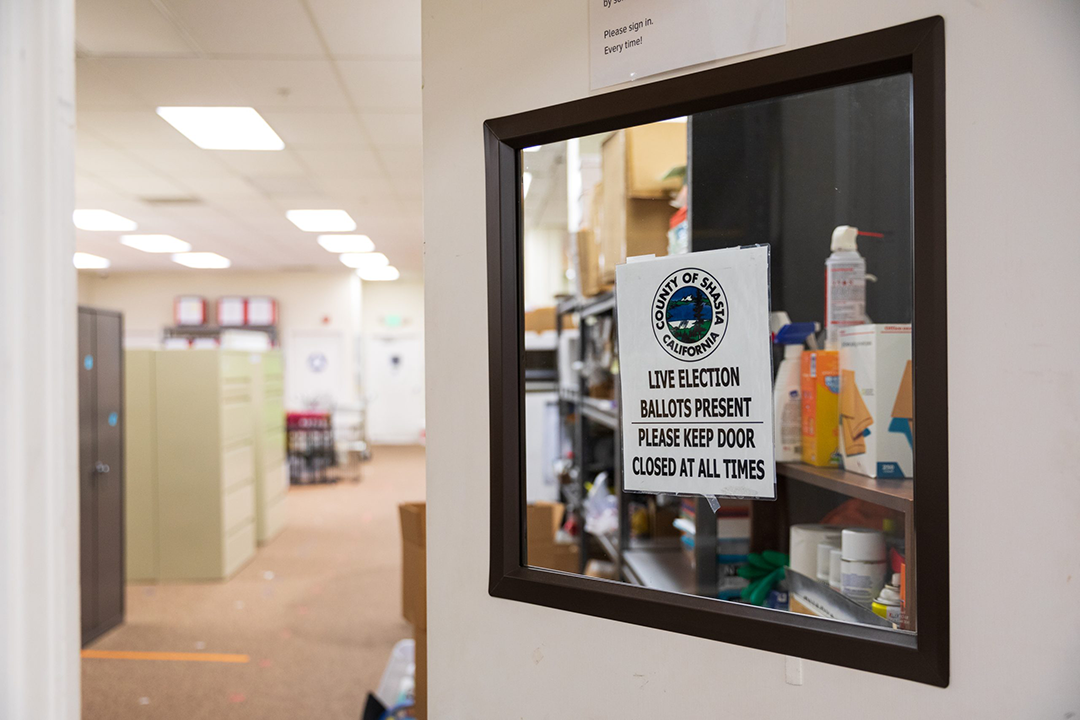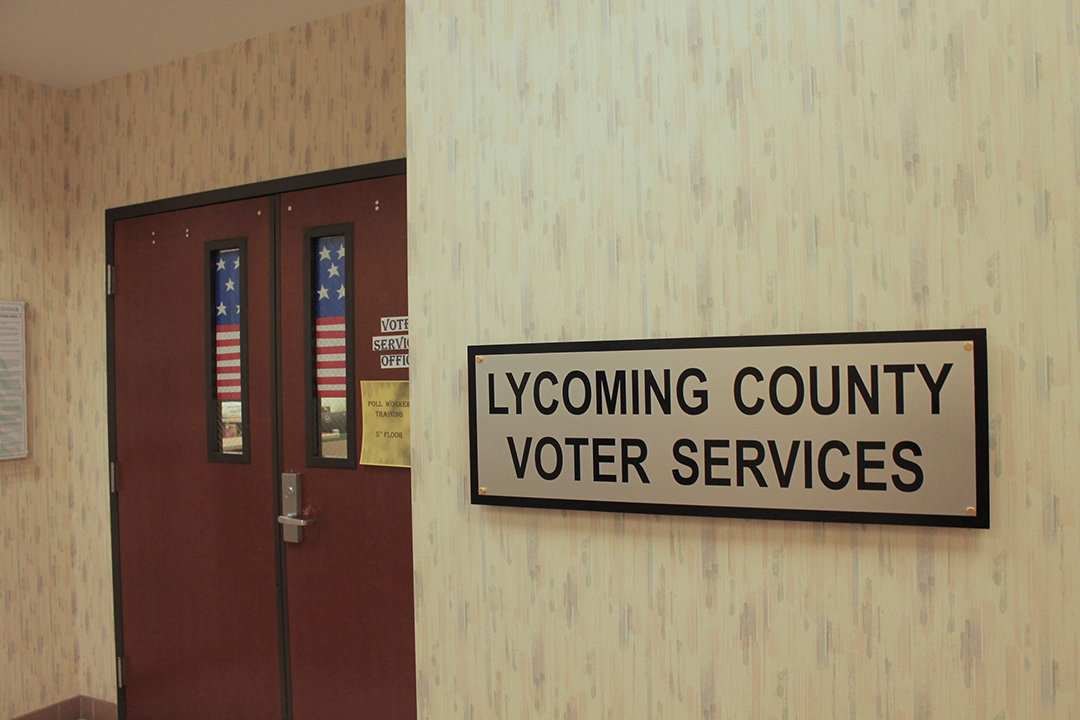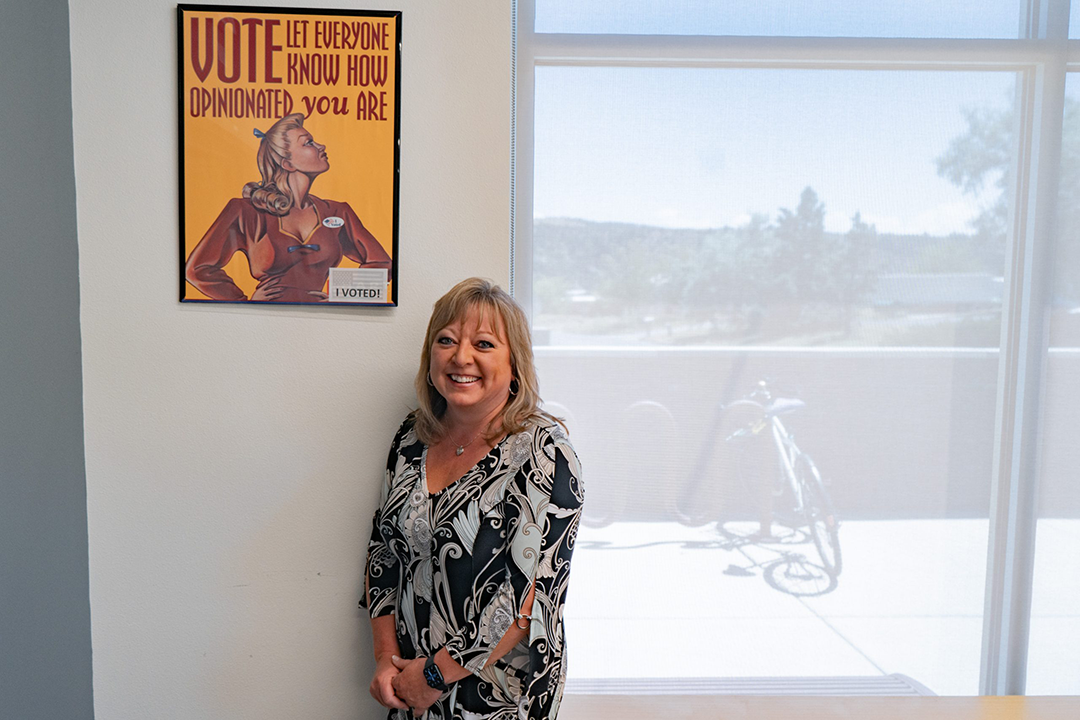Election deniers focus recruitment in 'out of the way places'

Emma Williams
Election deniers focus recruitment in ‘out of the way places’
The interior of the Shasta County, California, elections office on August 16, 2023
When people ask how Cathy Darling Allen is doing, she no longer responds with the socially-appropriate “fine” people expect to hear, because she’s not fine.
For more than two years, Allen, who runs the elections office in northern California’s Shasta County, has spent much of her time fending off accusations that her office falsifies election results.
“I’ve actually heard people say, ‘Well, you’re cheating to get where you want so that your people will win,'” Allen said in a Daily Yonder interview. “Oh, Lord, if I only had the time for that.”
In January 2023, the Shasta County board of supervisors decided in a 3-2 vote to cancel their electronic voting system contract after mounting pressure from election deniers. The county is the center of a small metropolitan area and has a mix of rural and urban communities. It comes in at more than 112,000 registered voters and now plans to use a hand-count system.
The decision adds to the growing number of counties – rural, suburban, and urban – where election deniers have successfully urged local governments to recount election results or throw out electronic voting machines altogether.
The Daily Yonder looks at how grassroots election deniers are affecting rural election officials and threatening civic infrastructure in rural America in the wake of the 2020 presidential election.
While the movement has targeted communities of every size, civics experts say rural communities have the most to lose from the pressures of the election denial movement.
“We’re at this period that I think should be being celebrated as a sort of high point of participation in American democracy,” said Justin Grimmer, a political science professor at Stanford University who studies election denialism, in a Daily Yonder interview. But the election denial movement threatens this progress, he said.
Voter turnout in the last three federal elections broke records. The 2020 presidential election saw the highest turnout in the 21st century with 66.8% of citizens age 18 or older casting a vote, according to the U.S. Census Bureau. A series of reforms have also been passed to make election infrastructure – how votes are cast, counted, and reported – safer and more efficient.
Former President Donald Trump’s unfounded attacks on the U.S. election system and the resulting election-denial movement put these gains in jeopardy. Rural areas could be among the first to suffer from the attacks.
Rural America already has lower voter turnout rates, which some researchers argue is due to inadequate election infrastructure. One 2022 study found that voting-by-mail restrictions hurt rural voters the most because there are fewer rural polling locations than urban ones, increasing the distance a person must travel to cast a vote. Along with skepticism about electronic voting machines, election deniers have also questioned the use of mail-in ballots, even though voting by mail has been used in some form in the United States since the 1860s.
Reversing the progress that has been made to improve election infrastructure – the use of equipment that more accurately counts votes and ensuring better access to voting through absentee and mail-in ballots, for example – could set back civic participation, Grimmer said.
“If localities start acting in a reactionary way because of these election integrity groups and they decide that they’re gonna peel back some of these reforms … you could actually end up eliminating some of the transparency that has been implemented,” Grimmer said. “It may be harder to track your ballot, which could ironically make people more skeptical about the election than they were before.”
The current election denial movement began in the months leading up to the 2020 presidential election. Trump said in a speech to supporters in August of that year that “the only way we’re going to lose this election is if the election is rigged.” He voiced similar comments on Twitter (now X).
In the weeks following the election, organized efforts began in several states to overturn the election results, claiming the elections were stolen. (In mid-August 2023, Trump was indicted in Georgia on charges that he and others illegally tried to overturn the election in the state.)
Then came January 6, 2021, when more than 2,000 people broke into the Capitol in an effort to block certification of the Electoral College results. (In early August 2023, Trump was indicted on federal charges related to those events.)
After Trump left office, the election denial movement shifted to a core group of “influencers,” including MyPillow CEO Mike Lindell, former business-law professor David Clements, former math and science teacher Douglas Frank, and former U.S. Army Captain Seth Keshel. Over the past two-and-a-half years, these influencers have made it a full-time job traveling the country to spread the election denial movement’s primary message: elections are being stolen, and it’s the government’s fault.
In some places, this messaging has worked. According to data compiled by the Daily Yonder as of August 24, 2023, seven U.S. counties have successfully held a hand-count or plan to in future elections.
Along with Shasta County, California; Spalding County, Georgia, and Cleburne County, Arkansas, recently approved hand-counts for future elections. Nye and Esmeralda counties in Nevada, both held hand-counts for their 2022 elections, as did Tripp County, South Dakota. Lycoming County, Pennsylvania, recounted by hand the results of the 2020 presidential election in January 2023.
Four out of the seven counties that held a hand-count or completely eliminated their electronic voting systems are nonmetropolitan, or rural.
Some voting districts within counties in Maine, Massachusetts, New Hampshire, Vermont, and Wisconsin plan to hand-count ballots in 2024, according to the nonpartisan organization Verified Voting.
But many pushes to pass hand-count policies have failed. In June of 2023, Governor Katie Hobbs of Arizona – the only state to try mandating hand-counts statewide – vetoed a bill that would have allowed any county in the state to hand-count ballots. Similar efforts at county and municipal levels have also failed.
Although the movement’s success may be waning at the moment, some civics experts warn that election denial “is down … not out.”
![]()

Claire Carlson
Election deniers are taking to grassroots efforts and leveraging ‘road shows’ to influence voters and force election result recounts
The exterior of the Lycoming County elections office in Williamsport, Pennsylvania
Election deniers are now putting energy into grassroots organizing, a quieter version of the loud-and-proud campaigning led by Trump that occurred in the movement’s nascent days.
“They’re kind of spreading the [erroneous] word about how voting machines particularly are stealing elections, and they’re encouraging people to put in Freedom of Information Act-types of requests and at the extreme, encouraging let’s just say impolite behavior toward election officials,” said Charles H. Stewart, a professor of political science at the Massachusetts Institute of Technology, in a Daily Yonder interview. Stewart published research in early 2023 exploring the characteristics that lead people to the election denial movement.
“The thing that we’re seeing in 2020 that we didn’t see in 2016, or in 2012 or other times when these sorts of [election integrity] questions arose, is that we now have about a half-dozen of these traveling road shows,” Stewart said. Few of these “road shows” are held in major cities, according to Stewart.
An NPR analysis of grassroots election denial events between January 6, 2021, and June 30, 2022, showed that the gatherings occurred in nearly every state. The events hit major cities like Minneapolis, St. Louis, and Washington, D.C. But they tended to steer toward the suburbs, smaller metropolitan areas, and in some cases, rural counties.
In Pennsylvania, for example, the NPR database shows there were no events in the city of Pittsburgh, but four counties within the Pittsburgh metropolitan area did have events. Philadelphia had one event, and there were two in the city’s surrounding counties. Only one Pennsylvania event on the NPR list was in a nonmetropolitan, or rural, county.
These in-person events distinguish the election denial movement from other far-right conspiracies that have existed primarily online.
“The election integrity movement is distinct from something like QAnon, which was by and large an online phenomenon,” said Stanford University’s Grimmer. “Here, I think it’s reversed.”
While people are getting some of their information about election denialism online, Grimmer said, the real force of the movement comes from the in-person meetings. “Individuals are coming together, discussing the things that they think are surprising or suspicious in their local elections and then actually going out in their community and doing something,” Grimmer said.
This played out in Lycoming County, Pennsylvania, a small metropolitan area with about 114,000 residents. In January 2023 a local election denial group successfully petitioned for a recount of the 2020 presidential election. Most of the group’s organizing has been conducted in-person at various community centers around Williamsport, Pennsylvania (population 28,000), the Lycoming County seat.
Poll workers recounted nearly 60,000 ballots by hand; the difference between the electronic and manually-counted ballots came in at just a handful of votes. Election officials attributed the difference to poorly-circled ovals on the ballot that the machine could not detect.
Lycoming County’s elections director Forrest Lehman says the election denial group represents a loud minority in the community. “I think it’s easy to walk up to somebody and get them to sign almost anything,” Lehman told the Daily Yonder. “In doing this hand-count, probably 4,900 out of those 5,000 people [who signed the petition] are gonna say, OK, well fine. I guess the results were correct.”
But it’s the other 100 people who are driving the movement in rural areas like Lycoming County, Lehman said.
Even after the hand-count results showed no proof of fraud in the electronically-counted ballots, the local election denial group has doubled down on their accusations, inviting election denier Sam Faddis, a retired CIA officer, to speak at their meetings. Like the election deniers touring nationally (such as Mike Lindell and Seth Keshel), Faddis has toured Pennsylvania to speak with other election denial groups.
“They allege that our vote totals were off by thousands based on these questionable statistical analyses that are being peddled not only in this state, but in a lot of places by a couple big names that keep coming up,” Lehman said.

Ilana Newman
Heading into the 2024 election cycle, officials are bracing for heightened accusations of fraud—and the threats that often accompany them
La Plata County Clerk Tiffany Lee in the county elections office on July 31, 2023
Nearly 2,000 miles to the west of Lycoming County, a county clerk is experiencing similar accusations fueled by the election denial movement’s main talking points.
In La Plata County, Colorado, an influx of open records requests have poured in since 2020 challenging the election tools the county uses, which include Dominion Voting Systems – an electronic voting hardware and software company – and mail-in ballots. The county has relied on mail-in ballots since 1992.
“What’s happened to us is people from the outside and different organizations that don’t have anything to do with our local communities are attacking us because ‘Oh my gosh, you have Dominion or you use mail ballots and we don’t trust you,'” said La Plata County Clerk Tiffany Lee (pictured) in a Daily Yonder interview. “That’s been really hard on us.”
Most of the open records requests use the same language provided by state and national election denial groups, Lee said.
Lee has not experienced the violent threats other election officials have received (a Maricopa County, Arizona election official received death threats through voicemail in 2021, for example), but her office is on high alert, especially as they move into the 2024 presidential election year.
And they have good reason to be.
In 2021, the U.S. Department of Justice established the Election Threats Task Force to investigate threats to election workers, which they identified as on the rise post-2020.
In the task force’s first year, more than 1,000 threats were reported, and approximately 11% of them met the requirements for federal criminal investigation, according to a press release. Of the potentially criminal threats, 58% of them were in states with post-election lawsuits, audits, and recounts.
In May 2023, the Department of Homeland Security released a national terrorism advisory bulletin that warns of a heightened domestic violence threat moving into the 2024 election year. The causes for this violence include individuals’ “perceptions of the 2024 general election cycle and legislative or judicial decisions pertaining to sociopolitical issues.” The advisory expires November 23, 2023.
The psychological toll these threats take on election workers is severe: In Colorado, 23 of the state’s 64 county clerks were new to the office last year, according to Lee. This high turnover poses another risk to the elections process.
“If we chase off election workers with this insanity, we’re going to make elections run more poorly,” said Grimmer from Stanford University. “We’ll be hemorrhaging so much experience and expertise for no reason other than the sort of falsehoods that are in people’s brains.”
As election officials gear up for local and state elections this November and a presidential election next year, county clerks are preparing to head off even more fraud accusations.
Rural county clerks hope their communities will trust them through the process.
“We’re just here to do our jobs,” Lee said. “Just like your county treasurer, your county assessor, your coroner, your surveyor; your county clerks are the same. We’re just administrators of the law.
“And I hope that rural communities across the United States understand that, that we’re just human beings doing good work for the people’s voices to be heard.”
This story was produced by The Daily Yonder and reviewed and distributed by Stacker Media.